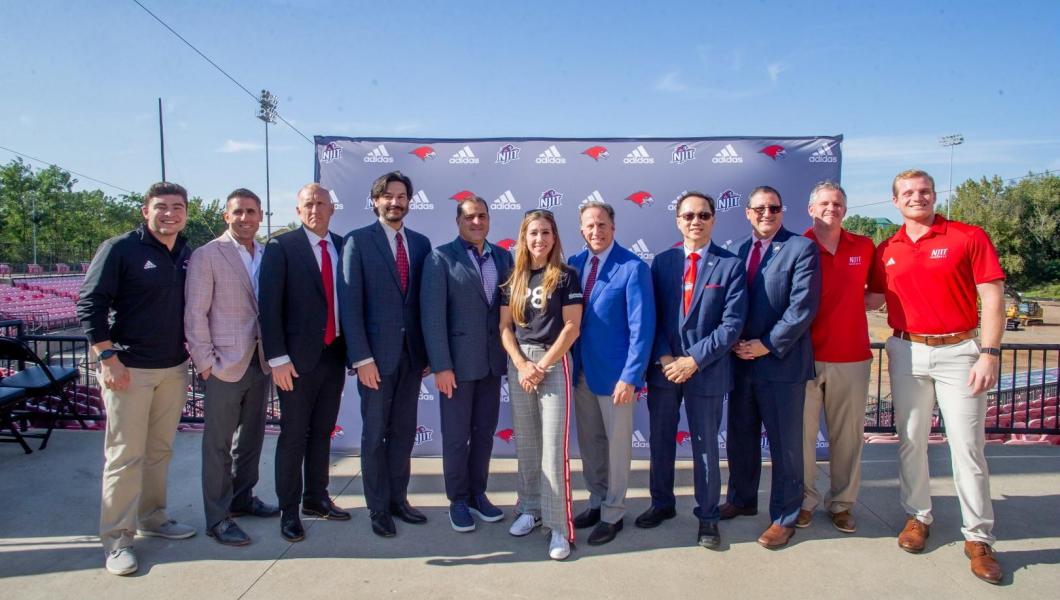NJIT Highlander Athletes Hear Life Lessons from NFL Veteran Roman Oben

Roman Oben, the National Football League’s vice president of football development who played 12 years in the league as an offensive tackle, spoke to NJIT athletes and employees on campus at the start of the fall 2024 semester.
Oben focused on lessons learned from his experiences on the field, in the classroom and in business. His playing career included four years with the New York Giants, who in 1996 drafted him from the University of Louisville, and two years with the Tampa Bay Buccaneers, where he helped cap the 2002 season with their first Super Bowl victory. He then began a management career in sales and marketing, working his way up to his current executive role.
Evaluating data is an important part of Oben’s job in the NFL, and sports data analytics are a recently created concentration in NJIT’s Martin Tuchman School of Management, which hosted the lecture.
Oben spoke of two important similarities in his life to NJIT students. One is that he was a first-generation college student from an immigrant family, moving to the U.S. at four years old with his mother from Cameroon. Another is his lifelong focus on education. He earned a bachelor’s degree in economics while playing top-level college football, completed a master’s in public administration during the NFL offseason in 2001, lobbied to get continuing education benefits for retired players and instills the same values in his own children today.
“I think the core of who I am, was a student athlete that always maximized his experience off the field, and so being Academic All-Conference every semester was important to me. I would say that offensive lineman are the smartest people in the room, quarterbacks are second,” he joked. “You have to deal with so much complexity throughout the course of play.”
Oben also emphasized the impact of culture shock and the importance of reconciling assumptions, upon joining any new community. He said that he arrived in Louisville as a defensive lineman, a position often dominated by Black players. Then, “I got converted to offensive lineman, and the first meeting we had was me and like 14 white guys, and they were talking about hunting and fishing and riding dirt bikes. And I had no idea what the hell they were talking about. I grew up in D.C. and took the train to school every day.”
“So it’s funny, but what football did for me culturally at that time, is just bring people together that typically would not have been together. And I’ll share this quick cultural story. I had a teammate, I won't say his name. He was from Alabama, and he talked about his grandfather dying, and so they had to go clean out his home. They found a uniform that belonged to a group I don’t need to mention, and he talked about how embarrassed he was that grandfather was aligned with that. The fact that he can share that with me, and have me not judge him. And this was the 90s, this wasn’t last week.”
“I was able to acknowledge his embarrassment and just see him as a friend, as someone that wasn't what his grandpa represented. So I think that's just what football does for me, and that's why we need football and we need sports in general — putting on the same jersey to accomplish a goal.”
Today, Oben is responsible for the business strategy behind all of the NFL’s youth development initiatives. He reports to the league commissioner, Roger Goodell, and indirectly to all 32 team owners, general managers and head coaches.
It’s not well known, he said, that student-athletes have high graduation rates. Sports teaches students about dealing with adversity, failure and rejection, which are useful lessons to draw from in college or at a full-time job. “Athletes need to know that’s an empowering thing, it’s not a negative. We say that, but we don’t always believe it. If you really believe it, you’ll be way more successful,” he stated.
Oben advised student-athletes in attendance to focus only on what they can control, compartmentalize physical tasks from mental ones and start building their personal network as early as possible — but to avoid negative people who can only bring you down.
When starting the next phase of their life beyond sports, “Walk in and own the room and say, ‘This is who I want to be’,” Oben commented. “You're actually setting a game plan, setting goals, making you magical. I'm sure your parents have told you that. I'm sure your teachers told you that. I tell young people, don't live the emotions that come on everybody. Live what the situation is.”
“Roman's focus on data analytics resonated, considering our school's emphasis on this growing field,” said Oya Tukel, dean of Martin Tuchman School of Management. “His personal story underscored the importance of resilience and dedication. His message about overcoming adversity and the significance of building a personal network early on struck a chord, particularly for students balancing academics with athletics.”

